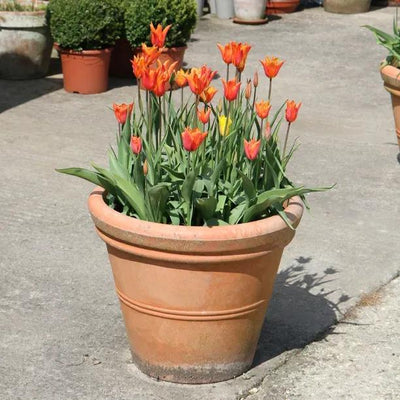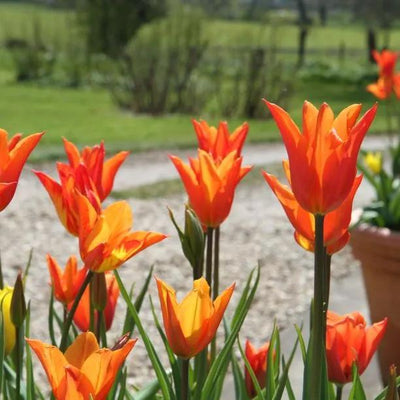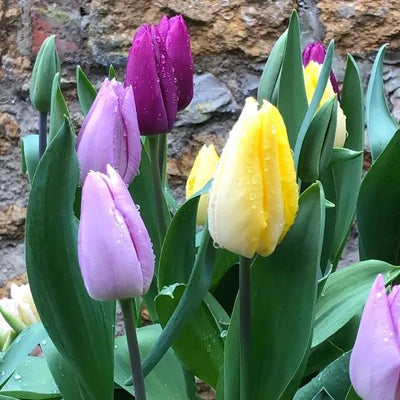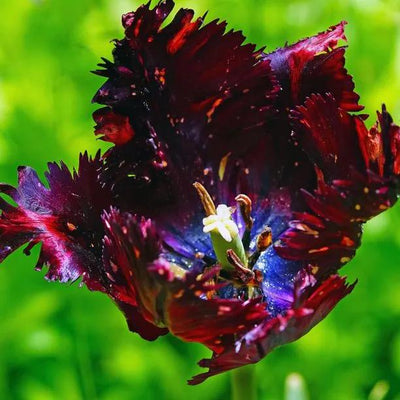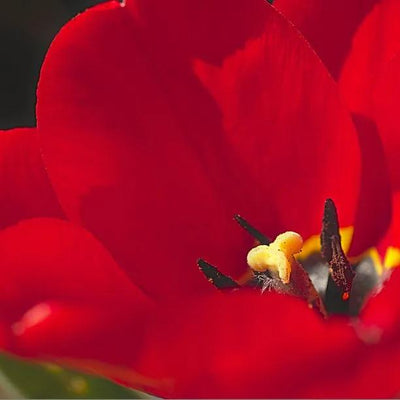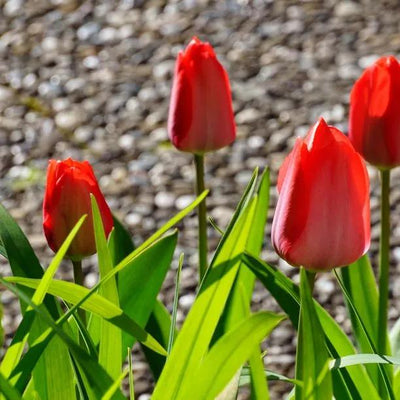Buying Tulip Bulbs Online
Order Dry Bulbs Now For Autumn Delivery & Planting
Tulips come in almost every colour and a wide range of sizes. The dwarf "rockery" tulips are tough and often flower with frost on the ground.
The later, larger, border tulips are also hardy but prefer more light, and shelter from the wind.
Planted in a border, they spread and put on a show before your perennials and sweet peas are ready to strut their stuff.
Browse the rest of our range of spring flowering bulbs, or all garden bulbs.
- Uses: Tulips are ideal for containers, rockeries and well drained borders etc where they can naturalise.
- Good Points: Wonderful range of colour, shape and flowering time
- Position: All tulips like the sun, and fertile soil that is dry in winter. The larger varieties need a bit of shelter from the wind.
Premium Dutch Tulip Bulbs
Holland is the home of tulips, and we import only their premium grade bulbs. Bigger bulbs make better flowers.
Bulbs that you buy on special offer at the supermarket are generally not premium sizes, which is why they are cheaper!
Your bulbs are delivered by mail order direct from our nursery, along with expert advice and friendly support.
Which Tulip Varieties are Best to Buy?
Choosing the right Tulips is as "easy" as picking your favourite flower from hundreds of varieties: the problem is stopping!
As with any garden plant, if in doubt, look for the RHS Award of Garden Merit (AGM), which is given to plants that are both beautiful and easy to grow in the average garden.
Breeders produce new varieties every year, and over 170 hold an RHS Award of Garden Merit, so any list of recommendations will omit world-class flowers.
These are a few of our favourites, by colour:
Best Tulips for Containers
Hot orange Orca is stunning and works in almost any container, but is born for terracotta.
For a breathtaking aroma with your potted Tulips, try the classic combo with matching Hyacinths: Finola plus Carnegie for white, Red Riding Hood with Jan Bos for red, or Peach Blossom with Fondant for pink.
Best Tulips for Borders
The best border tulips really depend on the other flower colours you have in April/May.
- Foxtrot: Fully double, this flurry of pink and cream petals, planted in small drifts, is always ready to appear on Strictly Come Dancing.
- Albion Star: Speaking of windy sites, this delicate white bloom with pink flushes on short, sturdy stems is one of the toughest varieties and can take pretty much any kind of British weather.
- Black Parrot: No collection is complete without a parrot or three.
Best Tulips for Naturalising
Naturalising with tulips is not quite the same as with Daffodils, which can colonise almost anywhere. Tulips generally need good soil.
In practice, this means that most of them only "naturalise" well in borders, rather than lawns.
Our Naturalising Tulip Collection makes it easy for you, containing the toughest varieties that can compete with grass, such as Creme Upstar (the actual mix may vary).
Will Tulips Grow in my Garden?
Almost certainly! They are not fussy plants but are happiest with the following:
- Sun - They all flower best in a sunny spot, but some will do OK in dappled shade.
- Soil - They are quite greedy, so plant them in good soil containing plenty of organic matter with decent drainage.
- Wind - No bulbs really like the wind, but the longer their stems, the less happy they are.
Read our Growing Tulips Guide for more details:
When to Plant Tulips?
You can plant Tulips any time during Autumn (September - November/Early December) when the bulb is dormant.
- There is less risk of disease in cooler soil, so November/Early December is considered the ideal time.
- Disease risk is low for the home gardener in most cases, but it's best practice to play it safe with large planting projects where a lot of bulbs are on the line!
How to Plant Tulips?
If your soil is wet and acidic, Tulips will flower perfectly well, but they won't establish, and you will need new bulbs every year. Just treat them as annuals, and don't waste your time with what follows!
If your soil is neutral to alkaline, then if you take a bit more trouble most Tulips will establish and multiply if well planted. Dig a hole 6-8" (20cm) deep, spread a couple of inches of compost in the bottom and put the bulbs on it 3" apart. Cover with soil.
If you plant as deep as this they will flower more reliably in subsequent years.
For strong establishment and the best flowering, we recommend using the Bulb Starter Rootgrow blend.
Tulips as Cut Flowers
On the plant, in cool weather tulips can last for as long as six weeks. Indoors they can still look good as cut flowers for up to 10 days. Cut when they are still in bud and just showing some colour.
Put the stems directly into a vase of lukewarm water containing a teaspoon of sugar and a very little bleach out of direct sun. Keep water level about 1/3rd up the stems and change every 3-4 days.
Rotate the vase daily.
Tulip Aftercare
Keep weed-free.
Dead-head as soon as the petals have fallen.Feed with a high potassium fertiliser like ‘Tomorite’ weekly for four weeks after flowering.
When the foliage has completely died down, you can lift (see below) or cut the leaves off and leave the bulbs in the ground.
Do I Need to Lift and Store My Tulips?
Depending on the variety and your situation, it is often best to lift your bulbs and store them overwinter, after the leaves have died down.
If you choose lift your bulbs, clean off any soil and throw away any that are diseased, damaged or undersized. Spread them out to dry completely before hanging them in net bags in a dry, warm, dark, place where they can stay until replanting time.




